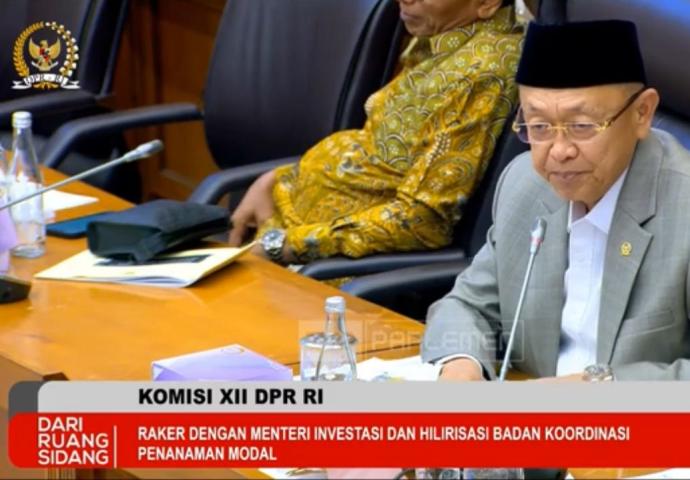News
Cek Endra calls for coconut, energy investments to Jambi
WINDONESIA December 12, 2024 (DPR)
(DPR)
Cek Endra, a House of Representatives (DPR) member from Functional Groups (Golkar) Party representing the Jambi Electoral District, expressed his views and ideas on the importance of equalizing investment throughout Indonesia, especially in Jambi Province, during a DPR working meeting on Dec. 3, 2024, with Investment and Downstreaming Minister/Investment Coordinating Board (BKPM) Head Rosan Roeslani.
He criticized how investment to Indonesia has so far been focused on five main regions, namely the provinces of Banten, Jakarta, West Java, and East Java as well as Sulawesi Island
"Meanwhile, the world's number one raw material is widely distributed outside Java, and this is our concern in the [other] regions," Endra said.
The former two-term Regent of Sarolangun then touched on the coconut industry, which is a leading commodity in the regencies of West and East Tanjung Jabung within Jambi Province. Although the regencies are rich in coconut plants, coconut farmers in Jambi could only sell at very low prices around Rp1,000 rupiah per fruit.
"We know that coconut water could be sold at very high prices abroad, but there is no adequate coconut processing industry there [in the two regencies]. This is an opportunity that must be utilized to attract investment to producing areas," he explained.
Endra emphasized that coconut downstreaming in Jambi can provide many benefits. The existence of a coconut manufacturing industry, including coconut water, coconut oil, coconut milk, and coconut fiber, could provide major added value to coconuts produced int he province. The industry's presence would also create new jobs for the local community and encourage economic growth in the region.
"We no longer want the people of Jambi to just be spectators of [the exploitation of] abundant natural resources. We hope that a coconut downstreaming industry could be built with the support of the central government, both in terms of financing, licensing, and investment promotion. This [industry] will change the face of Jambi's economy and provide direct benefits for coconut farmers," he said.
Endra also hopes that Rosan could utilize his ministry's international reach to promote Jambi's coconut potential investment abroad. With the global market continuing to grow, coconut products from Jambi have the potential to dominate the export market, especially with coconut water that is in great demand in various countries.
He hopes that coconut downstreaming would not only increase the income of coconut farmers, but also create a sustainable industrial ecosystem. The downstream industry, Endra noted, can also support environmental sustainability by utilizing every part of the coconut, from the water to the fiber, for environmentally friendly products.
"We want to create an industry that is not only economically profitable, but also environmentally friendly and sustainable. With coconut downstreaming, we could utilize [Jambi's] natural potential to the maximum, provide added value to the region, and improve people's welfare," Endra explained
He also noted the low investment to Jambi's mining sector, especially coal which is mostly produced in the province. He emphasized the importance of spreading out investment to coal-producing areas since many coal-fired power plants (CFPP) in Indonesia depend on them. He considered it necessary for CFPPs to be built in coal-producing areas so coal's investment value creation could be more efficient.
In response, Rosan expressed his support for efforts to equalize investment to regions that have great potential but have not received the optimal attention for investment. He emphasized that the central government will continue to strive to increase investment promotion and create opportunities for regions producing raw materials.
"We are very aware that equalizing investment is the key to creating sustainable economic growth. We will continue to work with local governments to attract more investment outside Java," he announced.

